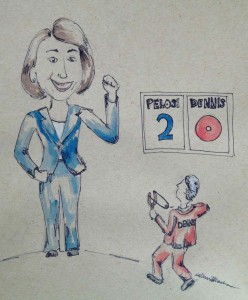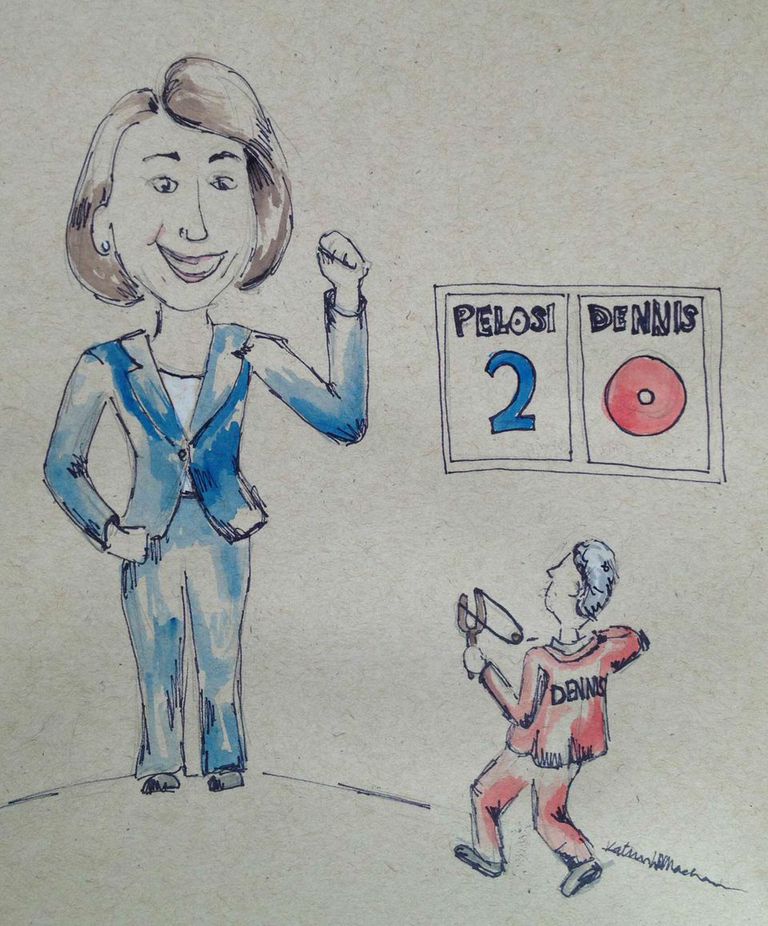
Art by Katrina Machado
John Dennis’ next few months look rough. Dennis, a San Francisco real estate agent, is traversing the city trying to generate support for his Congressional candidacy but is often brushed off and met with odd looks. His kind — Republicans — aren’t welcome there. And in this election, Dennis is not just running against any Democrat. He is attempting, for the third time, the Sisyphean task of trying to unseat House Minority Leader Nancy Pelosi.
Pelosi is in the leadership of the most unpopular Congress in history. But even as they flounder as a group, Pelosi and her colleagues are good at one thing — winning their individual elections. Over the last decade, House incumbents have won re-election more than 80% of the time. According to Dubious Democracy 1982-2010, a comprehensive report about the House of Representatives from the nonprofit Fair Vote, the average margin of victory in the House was 33 percent in 2010, and in seven states, “every [House] race was won by a landslide margin of at least 20 percentage points.” That means Dennis is just one of hundreds of party-backed candidates in American politics for whom winning a seat in Congress is highly unlikely.
In an interview with Dennis conducted by BPR, he describes what it’s like to challenge the House Minority Leader. Pelosi has been in office since 1987, and has climbed the echelons of US politics to become the highest-ranking female leader in national history. She also happens to be the incumbent Democrat in a city synonymous with liberalism. And Dennis, a libertarian running under the Republican banner, boasts support for some extreme ideas: a free market for money, abolition of the income tax and the sale of all foreign military bases. With GOP registration in Pelosi’s district at a paltry 8.6 percent, Dennis is David against Pelosi’s Goliath — except the end of the story is yet to be decided.
His odds might be paltry, but Dennis has fought tooth and nail for the opportunity to aim his slingshot. In 2010, he challenged Republican insider Dana Walsh, who had come in third place the previous election, behind an anti-war independent. Even though she had the support of the establishment and raised, in Dennis’ words, “$2 million to win the votes from a universe of only 40,000 potential Republicans,” he defeated her with 55 percent of the vote after a hard-fought battle that split the conservative and libertarian halves of San Francisco’s dwindling Republicans down the middle.
His goal was to “help as many people as possible see past the propaganda that they’ve been inculcated with since they were little kids.” His goal was to “help as many people as possible see past the propaganda that they’ve been inculcated with since they were little kids.” And if one thinks progressivism arises from public school propaganda, there is no better place to try and re-educate the masses than San Francisco. On the surface though, his experiment has failed. His 10-percentage-point victory dropped to a crushing 65-point defeat against Pelosi in the general election that year, and though his share of the votes stayed the same — 15 percent — in 2012, Pelosi actually increased her lead by 5 points that year. To be fair, this is an improvement upon previous Republican performances in the district, which means that Dennis’ vote tally remained double Republican registration, even when Democratic poll attendance skyrocketed for President Barack Obama. But the fact that his challenger won over 80 percent of the vote in two sequential elections took a toll. “As a competitive person, it’s not the easiest thing, on the election night,” he explained.
But this November, Dennis’ name will once again appear on the ballot. His explanations for running range from ideology to personal vendetta. Dennis speaks with conviction about “what the appropriate relationship should be between people and their government.” He preaches the gospel of the Golden Rule, a simple adage that drives his convictions both to abolish the Department of Agriculture and legalize weed. A dogged idealist, Dennis has laid out a mental framework for “voluntary” society of limited government and mutual respect. With such a grandiose message to spread, he seems a natural fit for politics — and the free media time and conversation with strangers that it affords.
David, however, at least got the chance to confront Goliath. Pelosi has barely acknowledged Dennis. The political realities of a safe seat at home and her fundraising prowess elsewhere have pulled her to campaign largely at other races across the country, to lend her star power to struggling Democrats. Dennis and Pelosi have, in fact, only met once — by accident, in a pub.
It was in Washington state, and Dennis remembers that “just for the few moments we spent together, she was lovely.” That was, until he brought up the idea of a publicized debate between the two. Immediately afterwards, she “shook [his] hand and then turned away.” And it is this that seems to irk Dennis even more than his uphill battle against his ideological opposite.
Pelosi hasn’t debated a rival candidate since a 1994 radio broadcast, but Dennis takes personal offense to her slight. “I think it’s disrespectful to not sit down and have some form of a discussion,” he said. “Some candidates are prohibitive favorites and yet they have the decency and courteousness to offer [a debate] with their opponent.” In fact, Dennis says Pelosi’s aloofness is one reason he is “still here.” He wants to force her to publicly confront some of her positions — on the NSA spying program, in particular — where Dennis runs to her left. He feels it will be “illuminating to San Franciscans” to hear from their representative of 20 years in the context of a debate.
Even if that is so, Dennis is a long way off from giving Pelosi a run for her money. She is popular for a reason; she’s a powerful progressive whose record largely aligns with her district’s ideology. Because of her political power, she has been able to direct funding to her district in the form of federal transportation grants and money for local businesses. She also has fundraising muscle that far exceeds anything in Dennis’s arsenal. He almost entirely takes his donations in small increments from outside California. “I suppose I would take PAC funding if somebody wanted to give it to me,” Dennis says, but his long-shot odds don’t make for a wise political investment.
Dennis, however, is trying to redefine the word “Republican” in San Francisco. This state of affairs would lead many to drop out. But many are also solely in it to win; Dennis is playing a longer game. Most improbable candidates are just there to fill a ballot slot, barring any drastic demographic changes or shady redistricting efforts. Dennis, however, is trying to redefine the word “Republican” in San Francisco, since he believes that the national Republican Party has poisoned his candidacy in several ways. “In areas particularly where Republicans find it tough to compete, the sins of the national party and national brand come down particularly heavily,” Dennis says. That’s especially true, in San Francisco, with the party’s relationship with the gay community. But Dennis doesn’t want to cast off the Republican mantle entirely, since he “probably wouldn’t be in the top two in November” without being a nominee of a major party.
Personally, Dennis doesn’t care who marries who, and would just like the government to get out of the marriage business altogether. His main campaign point is to end the NSA’s “4th amendment non-compliant” spying operations, which Pelosi failed to vote against. This dovetails nicely with his foreign policy, which is less militaristic than almost every current politician of either party. In other words, on several key issues, he is a Republican running to the left of his Democratic challenger.
By trying to find the places where his libertarianism overlaps with progressive San Franciscans, Dennis hopes to slowly chip away at the stigma of the “R” next to his name. To do this, Dennis will intentionally delay stating his party affiliation when talking to voters about his positions. He views these efforts as a sort of capital investment. “San Francisco is a bellwether of Republicanism in general,” he says. In running for office, he is “subverting what [voters] view as the stereotypical Republican.” As Dennis’ poll numbers hold their own against an unbeatable candidate, he sees a sign that a rebranding of Republicans as libertarians can bring them votes, if not yet victories, in urban centers.
Regardless of his politics, it’s hard not to have respect for candidate as indefatigable as Dennis. The most depressing Dubious Democracy statistic is this: “Nearly two in three eligible voters did not vote for a winning U.S. House representative.” Participation in government is at an all time low — and so is accountability. If hopeless candidates didn’t run now, incumbents wouldn’t even have to worry about perfunctory competition. By avidly spreading his message in the face of certain defeat, Dennis is playing his part. So while he says he’ll “always run to win,” Dennis’ quixotic campaign can claim some victory, even if he never reaches the Capitol.
Read the condensed interview with Dennis here
